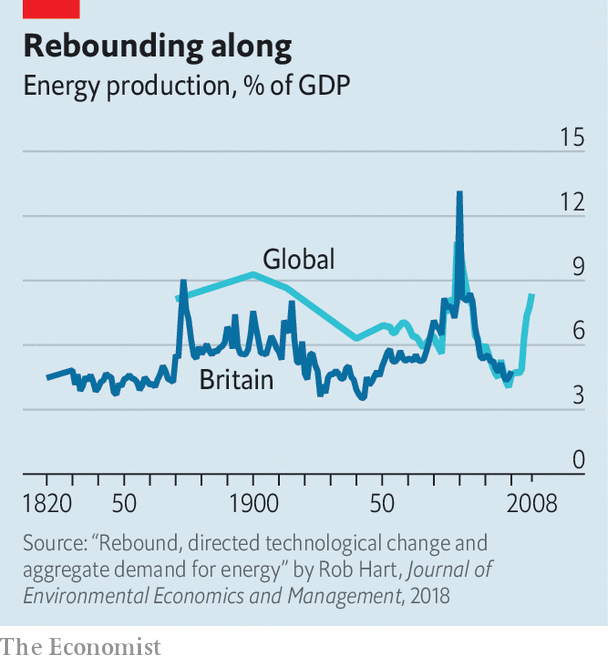Rebound effects are tricky to estimate

On oct 19th the International Energy Agency reported that doubling world gdp by 2040 would require only a small rise in energy demand if everyone adopted strict standards, like Japan’s for vehicle-fuel efficiency. That, the forecaster says, would be great news for consumers and the climate alike. Higher efficiency means less fossil fuel must be burned—and less planet-cooking gas belched—to power the global economy. But some economists are not so sure.
As nations grow wealthier, they have used more energy. Whether some of the extra joules consumed can be attributed to a more efficient use of energy has been debated since 1865, when William Stanley Jevons, a British economist, postulated that better steam engines would raise Britain’s overall demand for coal, rather than lower it. A new paper by Sebastian Rausch and Hagen Schwerin, of the Swiss Federal Institute of Technology, argues that something similar has happened in post-war America.
Greater efficiency in effect makes energy cheaper. So consumers want more: as cars guzzle less petrol, motorists drive further. Lower fuel costs also free cash for other things. Some of these—air travel or steaks—are also energy-hungry.
Such “rebound effects” mean that efficiency gains calculated by engineers are seldom realised in full. For households in the rich world, measured rebound rarely exceeds 30% of the potential savings; people have the inclination (or time) to drive only so many miles. It may be higher in developing countries, where consumers are further from satiating their appetite for travel or air-conditioning. Even there, it does not appear to eat up all the gains.
Economies are composed of more than households, however. Businesses, too, react to changes in relative prices, often in complicated ways. Greater energy efficiency translates into higher productivity—and higher returns to firms, making them attractive to capital. Resources freed by innovation may be allocated elsewhere. Over the long term, demand for energy appears much more responsive to changes in price than household studies imply. Were it less “elastic”, in economists’ parlance, the share of output going to energy production would not, outside a few oil shocks, have remained so stable over the past 150 years (see chart).

Resource reallocation—and any concomitant uptick in energy use—can be caused by other things, including economic growth plain and simple. To disentangle the impact of energy efficiency, Messrs Rausch and Schwerin have created what they think is the first macroeconomic model to link energy use to efficiency-enhancing technological change.
The provision of energy-dependent services requires combining capital (say, an electricity generator or a car) with energy (coal or petrol). Although it relies on complicated maths, in essence the model predicts energy consumption using energy efficiency and the relative cost of capital and energy. Fix energy efficiency, and you can calculate the energy use that would have happened in the absence of technological progress. When this counterfactual scenario is compared with what actually occurred in America between 1960 and 2011, the duo found that, as Jevons might have predicted, efficiency gains added to total energy use, offsetting 102% of the savings.
This is unlikely to be the last word. For one thing, the rebound depends on how easily energy can be swapped for other inputs (like capital or labour). The model assumes this is quite easy, but economy-wide empirical data are scarce. The authors also acknowledge that they have not considered policy-driven changes to efficiency, such as those in Japan. These, unlike technological progress, can raise producers’ costs. And no one denies that greater energy efficiency benefits today’s consumers. But settling whether it is a boon for the planet will, with luck, not take another 150 years.
No comments:
Post a Comment
Note: Only a member of this blog may post a comment.